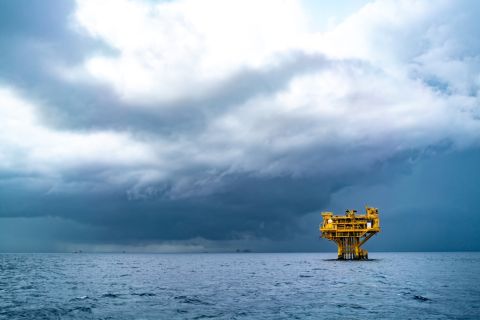
While the country does not have any major crude oil projects scheduled to come onstream, Sonatrach is exploring new frontiers, including offshore and in north Algeria. (Source: Shutterstock.com)
Algeria has focused its exploration efforts in the south since oil and gas was discovered in the country in 1956.
Algeria holds the third-largest amount of proved crude oil reserves in Africa, all of which are onshore because there has been limited offshore exploration. According to Sonatrach, about two-thirds of Algeria’s territory remains largely underexplored or unexplored.
Algeria held an estimated 12.2 billion barrels (Bbbl) of proved crude oil reserves, a figure that has been unchanged for many years. Most proved oil reserves are in the country’s oldest and largest oil field, Hassi Messaoud, in the eastern part of the country, near the Libyan border. Hassi Messaoud is estimated to hold 3.9 billion barrels (Bbbl) of proved and probable recoverable reserves, followed by the Hassi R’Mel Field (3.7 Bbbl) and the Ourhoud Field (1.9 Bbbl). Currently, it produces 1.1 MMbbl/d, having slashed 50 Mbbl/d as per OPEC’s quota production cut.
Algeria’s oil and gas industry is lagging mainly due to the lack of major investment, though almost 95% of government revenue comes from oil and gas exports. Algeria requires cutting-edge technological solutions to improve oil recovery factors, which are low compared with neighboring countries in the Middle East. Currently, Algeria’s reservoirs, which require EOR techniques, have a recovery factor of less than 20%, compared with 34% in Egypt, according to Shaheen El-Sayed, vice chairman of production for Middle East and North Africa at IPR Egypt.
Sonatrach, Algeria’s state oil company, plans to invest over $50 billion in E&P projects in the country over the next five years, Salah Mekmouche, the company’s vice president for E&P, said earlier this year. The plan includes drilling more than 1,300 wells between 2017 and 2021 and reaching an annual production rate of nearly 230 million tonnes of oil equivalent. Algeria’s oil and gas production rate per year is currently at 190-200 million tonnes of oil equivalent on average.
While the country does not have any major crude oil projects scheduled to come onstream, Sonatrach is exploring new frontiers, including offshore and in north Algeria.
Algeria has more than 1,200 km of coastline on the Mediterranean Sea where oil and gas offshore basins cover an area of 93,500 sq km. Only three offshore exploration wells have been drilled in Algeria, all of them in the 1970s. Only one of them was drilled in deep water, but it came up dry.
In 2012, France’s CGG-Veritas carried out the first seismic survey off Algeria’s shore and the results were promising, according to Sonatrach. The overall area of the coastal strip to be opened for exploration is estimated at 5,000 sq km. Prospecting activities covered offshore Bejaïa-Annaba perimeter (blocks 144-A and 145), and waters adjacent to the Willaya of Jijel, 350 km east of Algiers.
In early March, Eni and ExxonMobil Corp. (NYSE: XOM) signed a contract with Sonatrach to explore the North African country’s offshore area. “We have just been selected as operator of blocks in the exploration phase,” Eni’s CEO Claudio Descalzi said, adding geological and geophysical studies are still needed.
In the northern foldbelt of the country, Sonatrach has been active over the last few years exploiting the region. “The northern part of the country remains underexplored compared to the southern part of Algeria,” said Youcef Khanfar, head of explorations at Sonatrach. “Less than 100 test wells have been drilled in the last 60 years,” he added.
In late April, Sonatrach started drilling a test well in the Sirghine, Tiaret area west of Algiers. Drilling of the first test well follows a geological survey of the Boughzoul region that covered 1,300 sq km.
While Sonatrach keeps unveiling ambitious upstream plans, the lack of stability at the helm of the company is slowing efforts. Over the last seven years, more than five CEOs were replaced following the scandal that hit the company in 2010. This is in addition to political meddling in the company’s business, which hampered attempts to boost investments in the sector.
Recommended Reading
Hurricane Francine Shuts in Quarter of GoM Oil, Gas Production
2024-09-11 - The Bureau of Safety and Environmental Enforcement reported that 130 platforms and several rigs were affected as the storm approached the Louisiana coast.
US Oil Firms Evacuate Staff, Cut Drilling Ahead of Storm Francine
2024-09-09 - Francine is moving toward U.S. Gulf of Mexico waters and predicted to become the fourth hurricane of the Atlantic season.
Oil Prices Jump 4% on Reports of Iran Preparing to Attack Israel
2024-10-01 - An Israeli attack on Iranian oil production or export facilities could cause a material disruption, potentially more than a 1 MMbbl/d.
EQT Plans to Reverse Some US Natgas Production Curtailments in Oct, CEO Says
2024-09-25 - EQT, the biggest U.S. natural gas producer, has along with other U.S. drillers curtailed output in 2024 after prices collapsed to multi-year lows in the spring following a mild winter that left a tremendous oversupply of fuel in storage.
Oil Falls as Swelling US Supply Counters Middle East and Hurricane Risks
2024-10-09 - Oil fell on rising U.S. crude inventories but the risk of supply disruption from the Middle East and Hurricane Milton curbed price declines.
Comments
Add new comment
This conversation is moderated according to Hart Energy community rules. Please read the rules before joining the discussion. If you’re experiencing any technical problems, please contact our customer care team.


